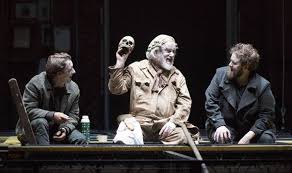Hamlet Sings! We Laugh!

Hamlet, Glyndebourne Festival Opera production, Adelaide Festival Theatre, 6 March 2018
You know the story, or perhaps you can condense it into one word, as did the English stage director Tyrone Guthrie: “Mummy!” But you might prefer to concentrate on the post-modern man Shakespeare seems to have had in mind with Hamlet: “the revolutionary whose manners and ways of life are attached to the old régime, whose ideals and loyalties belong to the new, and who, by a kind of courageous exhibitionism is compelled to tell the truth about both.”* Bloom calls the play (which admittedly, has its own structural problems), “the leading Western representation of an intellectual.”**
Brett Dean, after Verdi, courageously ‘operatized’ (or ‘half operatized’) the Bard at Glyndebourne last year and this most famous of all plays came to the Adelaide Festival as directed by the (almost) invariably great Neil Armfield, with the ASO under Nicholas Carter.
Was it just me? Or did anyone else view ‘Hamlet: the Musical’ aka ‘Hamlet: the Opera’ as this season’s surprise comedy hit ? Because, frankly, despite the solemnity with which Tuesday night’s crowd took in the proceedings, and despite the orgasm en mass at the curtain, your critic thought this piece was a hysterical travesty. It is not an opera. There are no arias, no recitatives, and certainly no bel canto! although there are choral pieces and those were some of the best parts of the show, as beautifully rendered by the State Opera and The Song Company (a private company of touring singers drawn from all over the country), on stage and off. Most of the vocals were delivered in a sing-song tremolo à la the links in Mozart’s Italianate comedies. As to the score, with its film-style flourishes, discordant chords and sound effects and strange, brassy notes, it owes more to Bernard Herrmann, the soundtracks to the lesser movies of M. Night Shyamalan and Weimar cabaret than the world of opera. Nicholas Carter and the pit players struggled through it manfully.
The playing up on stage was, however, decidedly patchy. Allan Clayton was Hamlet, or rather, John Belushi as Bluto in Animal House playing Hamlet. Without the gravitas. Without any sense of the noble Dane, the sweet prince. Douglas McNicol was a stout Horatio, though one seemingly older than Polonius, Yorick even. Rod Gilfry and Cheryl Barker as the King and Queen, and our mate Samuel Sakker as Laertes, played it straight, and that was when the piece was most effective (they were all very moving when Ophelia’s death was marked). Which brings us to Ophelia. Lorina Gore was perfectly adequate in that thankless role, but her mad scene was a comedy highlight. Dressed only in a dirty frock-coat and panties, she hurled herself about, brandished some weeds (presage of watery doom) and wailed, in a kind of cross between Lucia di Lammermoor, Baby-Jane Hudson and Vivien Leigh after too much laudanum. The most distinguished audience seemed to be taking it all deadly seriously – The Varnished Culture had to stifle guffaws. And Rosencrantz and Guildenstern, straight from the Mardi Gras, were re-imagined as mincing castrati, cut-down in the closing scene’s bloodbath whilst being used in vain by Claudius as human shields.
Am I making this clear? As to what is taken from the play, the composer and librettist might well parrot T.S. Eliot and say ‘these fragments we have shored against our ruin.’ The flashy bits (Hamlet sulks; Behold the ghost; Stabbed through the arras; the pas de deux of R & G; the graveyard ruminations; the final duel out of Quentin Tarantino – why does the dying Laertes remove his trousers?) are here, but the text is mangled beyond belief and we’re deprived of all profundity. There’s no music to enjoy, merely an unedifying cacophony. As might be expected of Armfield, there are clever (sometimes too clever) and moving set pieces: the mock play, the ghost’s appearance, the lament for Ophelia, the descending grave – are impressive, and the sets and lighting are, in the main, just right. But the play’s the thing, and it doesn’t work, it doesn’t truly ring! The rest is silence.
[* Cyril Connolly, referring to Nicolas Chamfort, cited by Kenneth Tynan in He That Plays the King (1950).] [**Harold Bloom, Shakespeare: The Invention of the Human (1999), p. 383.]Leave a comment...
While your email address is required to post a comment, it will NOT be published.



2 Comments